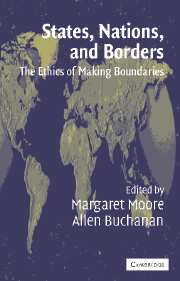Book contents
- Frontmatter
- Contents
- About the Contributors
- Acknowledgments
- 1 Introduction: The Making and Unmaking of Boundaries
- THE JEWISH TRADITION
- THE CONFUCIAN TRADITION
- THE CHRISTIAN TRADITION
- 6 The Christian Tradition
- 7 Christianity and Territorial Right
- THE NATURAL LAW TRADITION
- THE ISLAMIC TRADITION
- THE LIBERAL TRADITION
- THE INTERNATIONAL LAW TRADITION
- CONCLUSION
- Index
7 - Christianity and Territorial Right
Published online by Cambridge University Press: 24 November 2009
- Frontmatter
- Contents
- About the Contributors
- Acknowledgments
- 1 Introduction: The Making and Unmaking of Boundaries
- THE JEWISH TRADITION
- THE CONFUCIAN TRADITION
- THE CHRISTIAN TRADITION
- 6 The Christian Tradition
- 7 Christianity and Territorial Right
- THE NATURAL LAW TRADITION
- THE ISLAMIC TRADITION
- THE LIBERAL TRADITION
- THE INTERNATIONAL LAW TRADITION
- CONCLUSION
- Index
Summary
Anthony Pagden is wise to take as his point of vantage that moment in the development of Christian thought at which the explosion of Western colonisation brought the questions of conquest to the fore, and elicited from a range of Catholic thinkers, led by Francisco di Vitoria, a discriminating and critical view. He is also quite correct to see their perspective on the question as deriving from the Aristotelian renaissance of the high Middle Ages, which influenced the Catholic thinkers of the sixteenth century, especially through their rediscovery of St. Thomas Aquinas. It is hard to imagine Vitoria's great contemporary, Luther, taking up the colonial conquest of the Americas with anything like the same insight, not because Luther was uncritical of power-hunger or expansive self-aggrandisement, but because he lacked a purchase on the political categories needed for a discussion of territorial right.
Beyond this point, however, I hesitate to follow Pagden in his distinction between Augustinian and Thomist streams of Christianity. It seems to suggest, on the one hand, that the aspiration to transcend limitations of place did not affect Thomists, and, on the other, that the pre-Thomistic first millennium of Christianity was not aware of the significance of place. Both suggestions would be mistaken. In the first place, Thomists were prominent in the mid-twentieth century wave of philosophical scepticism about territoriality; one went so far as to write: “Living together does not mean occupying the same place in space.… Living together means sharing as men, not as beasts.”
- Type
- Chapter
- Information
- States, Nations and BordersThe Ethics of Making Boundaries, pp. 127 - 140Publisher: Cambridge University PressPrint publication year: 2003
- 1
- Cited by



